When poetry was involved in war….
Maryam Asadi Jafari
Translated by Natalie Haghverdian
2019-04-30
Iran Oral History Website – Ahmad Zareie[1] is a name intertwined with the past and present of the “Holy Defense Poetry Congress” and no poet of the time has forgotten his name. “Majid Zehtab” who suggested the Holy Defense Poetry Congress during war and took the first steps to set up the event has original and worthy memories of the late Ahmad Zareie and other poets of the era. Zehtab remembers Ahmad Zareie as a brother and an unforgettable friend, and decades after his demise, he is still sensitive to his name. We had an interview with the Commander-in-chief Behrouz Esbati on the “Holy Defense Poetry Congress”; now, let’s hear a different narrative from Majid Zehtab.
Mr. Zehtab, when and where were you born?
I was born April 1960. However, it states October 1958 in my ID and I’m from Isfahan.
When did you start your education in Persian Literature in Ferdosi University of Mashhad?
Before revolution I studied mechanics, but I wasn’t interested. So, in 1993 I started Persian Literature in Ferdosi University of Mashhad.
When did you join the Guardian Forces?
In 1983 but I was recruited by the Ministry of education in 1979. When was started in 1980, I used to go to the fronts as Basij forces. My absences interrupted my career. Eventually I was asked to choose and I chose to go to the war. I resigned in 1979 from Ministry of Education and joined the Guardian Forces. It continued till 1998 when I was transferred to Ministry of Islamic Guidance.
Did your poetry date back to before the Revolution?
I was never a poet, and never perceived myself as one. But when you read poetry excessively, you get involved with its literature and eventually start writing. Nowadays, most of the literature professors write poetry. They know its origins and nature of poetry which makes one a poet; poetry is not to be studied. Some are poets by nature and some are not. I think I wasn’t. But since I knew its structure I used to write poetry every once in a while. I didn’t pursue it and never printed any poetry books. During my education and at university I used to write poetry and constantly attend relevant congresses and associations.
You are being modest. So, you used to write poetry here and there; till when you attended the literature faculty of Ferdosi University and became acquainted Ahmad Zareie which led to the war poetry.
No. I had some talent. When I attended university, Ahmad was a senior student before the Cultural Revolution. I was a junior student accepted in the first round after the Cultural Revolution; we were students in the same faculty. We had some mutual classes. I became friends with Ahmad Zareie for his charisma and his school of thought; we became close friends and attended the first Student Poetry Congress in 1983 or 4 together.
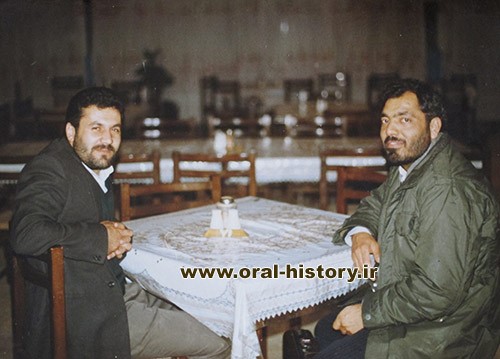
From right, late Ahmad Zareie, Majid Zehtab
Was war the theme of Students’ Poetry Congress?
Students all over the country used to send their poetry and the themes were unlimited. However, war was the dominant theme along with the culture of martyrdom and sacrifice for the country. Automatically most of the themes for poetry, story and films originated from war. Mostly, the poems were based on war.
When was the idea of War Poetry formed?
During my education, friends used to inform us of any major operations. I used to join them in the fronts. At the time we had weekly poetry meetings, the group members were so close. I didn’t want anyone to know that I’m joining the war. I didn’t want them to get upset and try to hold me back. Hence, I left without saying. When they figured out, Ahmad had gotten very upset and written a sonnet with my name it in. Years later, Alireza Qazveh collected Ahmad’s poems in a book “…Oh such a nice scent” and published it- the sonnet was in it but my name was omitted. I went to the operation. The next operation was far apart and I had nothing to do but to think about the glory of the students’ congress. I went to Khatam Olanbia base. Qolamali Rajaie was in charge of advocacy there. He was a nice and noble man and I have good memories of him. I told him that I want to run a war poetry congress but I need your help. He asked: “How?” I explained that we can issue a call from Khatam Olanbia base and ask all to send their poems. We will judge the poems and then invite the winners to read their poems in the congress. He said: “Write your proposal.” I did so. He said: “Arrange it, we will cover the costs. But it has to be coordinated with the advocacy department of the headquarters of the Guardian Forces.” A letter was sent to the headquarters. Ahmad Zareie was there; he had graduated and joined the forces. I was a student at the time. That’s how I saw him again. Majid Rajabi Memar was also in charge there and Behrouz Esbati was collaboration in Payam Enghelab[2] magazine with Ahmad Zareie. The congress was supported from Tehran and I was in charge of the field operation. The best event was the Basij week in October. It was decided to hold the congress in the same week.
When was the first congress held?
It was 1986 in Shahdi Chamran University in Ahwaz. I remember that it was arranged in between two major operations. I wanted to hold a culturally valuable event. Nobody knew anything or was experienced in the fronts for such an event. Imagine that we wanted the poets to join us but there were no flights to Ahwaz since the Iraqi fighters were circling Khuzistan all the time and they might attack a civilian airplane. All correspondence was through land. They used to attack trains as well. In general, travel was not easy. The other problem was that many prominent poetry features wouldn’t attend the war poetry congress. They never said that they are scared but never attended.
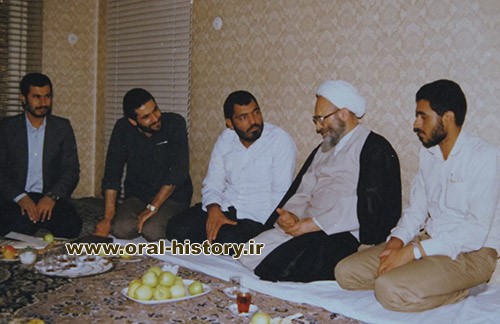
Lobby for the first Holy Defense Poetry Congress, from right to left; Abassabli Mehdi, Ayatollah Hassan Zadeh Amoli, Ahmad Zareie, Majid Zehtab, Ali Qolami
It seems that the first congress was a trial and error for you and an opportunity to measure the interest. What was the volume of the poems you received?
We never thought that there will be so much interest and the event went smoothly. The call notice contained the address and POBox of the Khatam Olanbia base. We received a huge load of which many were really good. A group of prominent war poets that I personally knew them, were invited. Such as Qeysar Aminpour, Seyyed Hassan Husseini, Mohammad Ali Mardani, Mahmoud Shahrokhi….
Many of the poets you named are prominent. Who was the most prominent of all?
The most prominent were Seyyed Hassan and Qeysar. Qeysar was a student at the time. He was from another country and they had given him a room in the Art Department. Ahmad Zareie and I used to visit him when we travelled to Tehran. Then, the Art Department was the most active in the literature of war and the Revolution.
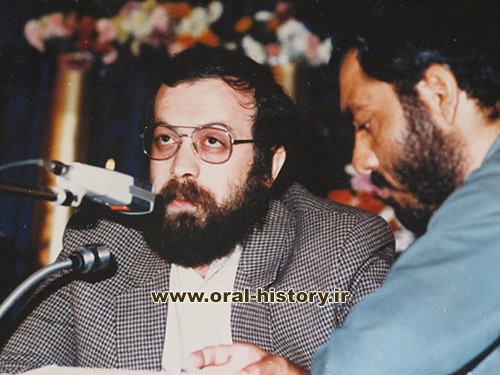
Late Seyyed Hassan Husseini in the Holy Defense Poetry Congress
Let’s talk about the poems you received. What was the dominant prose? Please share any memories you have:
They were mostly sonnets, among others. There were limited number of juries. It was me, Abasali Mahdi and Ahmad Zareie. Ahmad was in Tehran till the last day and joined us only for the event. Tehran was operated by Ahmad Zareie and Behrouz Esbati and the field work was with me. I remember that I didn’t know Mohammadreza Abdolmalekian at the time. I was sitting in the hall. I opened an envelope. The poem written inside read: “I wrapped his fourteen years in the grave cloth/ just like his love of life/ when I used to wrapped him in diapers. It was very impressive. We used to see young soldiers of the same age being martyred. The poem really impressed me. I left the room in the heat of Ahwaz. After an hour or so, someone came to fetch me and asked: “What’s wrong with you? Why are you sitting under the sun?” or Taha Hejazi had sent a beautiful poetry predicting the end of war. The poem addressed the Arvand River: “Now your children run on Arvand and deploy the grenades of laughter to the enemy…” It was epic. I still remember some of them.
You said travel to Ahwaz was difficult. How did you manage?
I came to Tehran to transport the Tehran University professors. A night before the event, a Land Crouse was dedicated to us by the Guardian Forces. I was 22-23 at the time. Fifty kilometers after the driver told me that he is sleepy and asked me to drive. I had no experience with the car and didn’t know the road. I thought that we have to make it to the event. I jumped behind the wheel and drove the whole night to Ahwaz. We got there in the morning and till afternoon I was arranging the hall and lunch and dinner. It was such an event.
You said that the Chamran University Hall was dedicated to the event. Tell us about the preparations.
It was the best hall available. We inspected it and it was good but they wouldn’t give it to us. We did a lot of correspondence through the Guardian Forces’ Headquarters to get it. We arranged the tribune in the morning of the event. I wanted it to look like trenches. I wasn’t experienced and I applied the ideas from the Students’ Congress, but I had no help. I made everything with sack bags and spread sand on the floor. The university was upset since it might have affected the electricity system. I resolved the issue anyway. I made the tribune like a trench. I collected the sack bags from the fronts and filled them with lighter material. I thought everything has to be real. Imagine that Ahmad Zareie, the vice president of the Guardian Forces’ Advocacy Department is holding the bags and I’m filling them. We were really tired when the work was over. We were wearing anticonvulsant overalls. When guests were arranged and the program was set to run we realized that there is no audience. We attended the event with those overalls. I have a picture of that day.
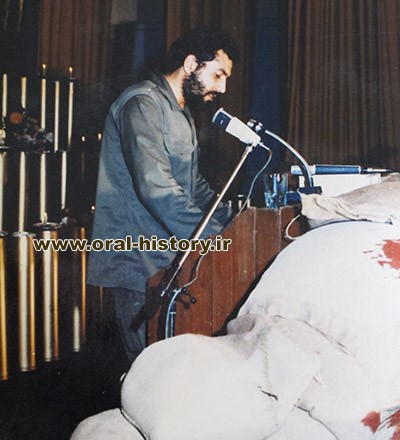
Majid Zehtab
Where there any other concerns?
I didn’t know how the event would go. For instance the concern of filling the hall. But then the Basij forces joined us from the fronts and the hall was packed.
Who had notified them?
I had sent the notice. I asked each unit to send their interested soldiers and they did. The ambiance was so good that I could never believe it is possible to have poetry and music in the middle of the battlefield. We had asked the IRIB to send us their music group and the TV broadcasted epic songs. The IRIB, interested in our event, had sent a full group. Some parts were directly broadcasted and since it was a new phenomenon, the word spread very quickly. Nowadays, it is very difficult to gather the same speakers in one room.
Do you remember the poets that recited their poems?
I don’t clearly remember but all were good. I can’t name them all. I remember some like Parviz Beygi Habib Abadi, Qeysar Aminpour,….and even Ahmad Zariei. Since I was a student, I arrange a bus to transfer a group of professors and poets such as Mehdi Farahani Monfared from Mashhad. None of the events after were as rich as the first one. I took the guests to visit Fav the next day. Professor Lahouti was very old and thin. On our way to Fav we joked a bit by making poetry for him. The spirit was good and no one was in fear of death. Fav was a war zone. Now, I’ll never do that again. I’ll never take civilians to such places. I took Dr. Hussein Fatemi to the trench in Fav. He said that he is not going back. We had to take him back by force.
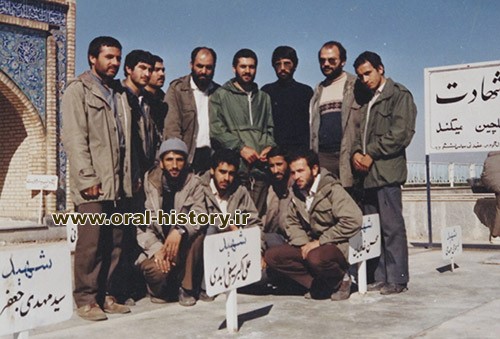
Graves of Hoveyzeh Martyrs with the Congress Team - 1986
Undoubtedly, the bravery and interest of the poets to the fronts was due to the dominant ambiance.
Yes. For instance all financial transactions for the event was with me and my overall pocket was full of bills to spend. I spent a lot, but I didn’t bribe or reward anyone. Fifty people used to sleep in one dorm. Food was provided from the fronts. The food distribution was not fancy but everybody enjoyed. They used to transfer the food with pick up. They would ask the number of the soldiers and distribute accordingly. In the congress, I asked many times if they’d prefer to have food delivered from a restaurant or from the fronts. They preferred to share soldiers’ food. We didn’t book hotel room. There was an inn in Chamran University, the elders were transferred there. The rest used to sleep in halls. The women were given a separate hall. It was all spiritual. A spiritual spirit found in the fronts.
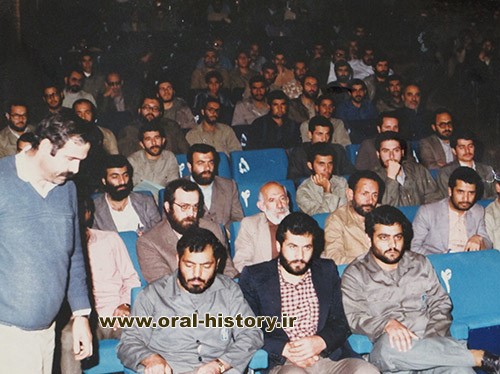
First row from right: Behrouz Esbati, Majid Zehtab, Ahmad Zarei
Second row from right: Ahmad Dehbozori (second), Seyyed Hassan Husseini (Fourth)
How long did you cooperate with the event?
I was good in founding and steering a difficult task, then leave it to others to continue. Ahmad Zareie and I were secretaries in the first event. In the second event we were involved but gradually moved out for others to continue. After the war, the title was changed to “Basij Poetry Congress” and now it is “The Holy Defense Poetry Congress”.
Almost thirty years after war, still its poetry continues. Where do you think the theme has to focus?
I started the congress. We consecrated the war at that time since it was to defend our country. I don’t regret that. But I think if now such an event is to be arranged, the poetry should be against war consecration. Like Qeysar Aminpour; at the time of war he was missioned to write epic poetry to provoke the spirit of war and defense but at his last years, he was writing poetry with the opposite theme. When the enemy invaded our country we had to steer the themes to war and defense but now we have no imposed wars and shall follow accordingly.
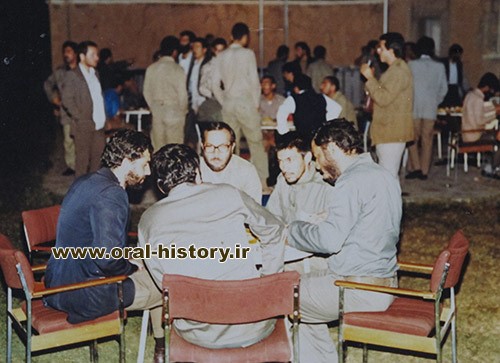
The first day of the congress, during planning: from right: Ahmad Zareie, Behrouz Esbati, Majid Zehtab, Mr. Safie, Hojjat OlIslam Javadi Husseini
[1] Ahmad Zareie, born in 1957 in Qaenat, Birjand. He moved to Mashhad with his family when he was three. He started school before he was six. He finished high school in Fuyuzat High School in Mashhad and was accepted at Tehran Univeristy in 1975. He fought in Kurdistan till the victory of the Revolution. He founded the Islamic Association in 1979 and continued his fight against the anti-revolution. He was the founder of Kurd Muslim Martyrs’ Organization. He died in 1993 in Khatam Olanbia hospital due to the side effects of the chemical attacks during war.
[2] Message of the Revolution
Number of Visits: 6081
http://oral-history.ir/?page=post&id=8518
